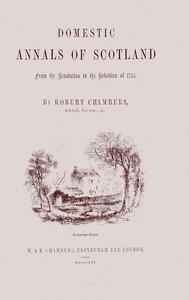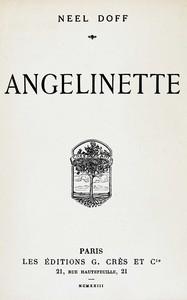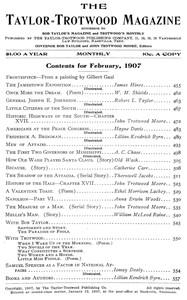|
|
Read this ebook for free! No credit card needed, absolutely nothing to pay.Words: 289202 in 97 pages
This is an ebook sharing website. You can read the uploaded ebooks for free here. No credit cards needed, nothing to pay. If you want to own a digital copy of the ebook, or want to read offline with your favorite ebook-reader, then you can choose to buy and download the ebook.

: Domestic annals of Scotland by Chambers Robert - Scotland History 1689-1745@FreeBooksMon 08 Apr, 2024 DOMESTIC ANNALS OF SCOTLAND. REIGN OF WILLIAM AND MARY: 1689-1694. Our narrative takes up the political story of Scotland at the crisis of the Revolution, when, King James having fled in terror to France, his nephew and daughter, the Prince and Princess of Orange, were proclaimed king and queen as William and Mary, and when the Episcopacy established at the Restoration, after a struggling and unhonoured existence of twenty-eight years, gave way to the present more popular Presbyterian Church. It has been seen how the populace of the west rabbled out the alien clergy established among them; how, notwithstanding the gallant insurrection of my Lord Dundee in the Highlands, and the holding out of Edinburgh Castle by the Duke of Gordon, the new government quickly gained an ascendency. It was a great change for Scotland. Men who had lately been in danger of their lives for conscience' sake, or starving in foreign lands, were now at the head of affairs--the Earl of Melville, Secretary of State; Crawford, President of Parliament; Argyle restored to title and lands, and a privy-councillor; Dalrymple of Stair, Hume of Marchmont, Steuart of Goodtrees, and many other exiles, come back from Holland to resume prominent positions in the public service at home--while the instruments of the late unhappy government were either captives under suspicion, or living terror-struck at their country-houses. Common sort of people, who had last year been skulking in mosses from Claverhouse's dragoons, were now marshalled in a regiment, and planted as a watch on the Perth and Forfar gentry. There were new figures in the Privy Council, and none of them ecclesiastical. There was a wholly new set of senators on the bench of the Court of Session. It looked like the sudden shift of scenes in a pantomime, rather than a series of ordinary occurrences. In Scotland, it gradually became apparent that, though the late changes had diffused a general sense of relief, and put state control more in accordance with the feelings of the bulk of the people, there was a large enough exception to embarrass and endanger the new order of things. There certainly was a much larger minority favourable to Episcopacy than was at first supposed; whole provinces in the north, and a majority of the upper classes everywhere, continued to adhere to it. A very large portion of the nobility and gentry maintained an attachment to the ex-king, or, like the bishops, scrupled to break old oaths in order to take new. Even amongst those who had assisted in the Revolution, there were some who, either from disappointment of personal ambition, or a recovery from temporary fears, soon became its enemies. Feelings of a very natural kind assisted in keeping alive the interest of King James. It was by a nephew and a daughter that he had been displaced. A frightful calumny had assisted in his downfall. According to the ideas of that age, in losing a crown he had been deprived of a birthright. If he had been guilty of some illegal doings, there might be some consideration for his age. Anyhow, his infant son was innocent; why punish him for the acts of his father? These considerations fully appear as giving point and strength to the Jacobite feeling which soon began to take a definite form in the country. The government was thus forced into severities, which again acted to its disadvantage; and thus it happened that, for some years after the deliverance of Scotland from arbitrary power, we have to contemplate a style of administration in which arbitrary power and all its abuses were not a little conspicuous. In the very first session of the parliament , there was a formidable opposition to the government, headed chiefly by politicians who had been disappointed of places. The discontents of these persons ripened early next year into a plot for the restoration of the ex-king. It gives a sad view of human consistency, that a leading conspirator was Sir James Montgomery of Skelmorley, who was one of the three commissioners sent by the Convention in spring to offer the crown to William and Mary. The affair ended in Montgomery, the Earl of Annandale, and Lord Ross, informing against each other, in order to escape punishment. Montgomery had to flee to the continent, where he soon after died in poverty. The offences of the rest were overlooked. The first emotions of the multitude on attaining confidence that the Prince of Orange would be able to maintain his ground, and that the reigning monarch would be brought low, that the Protestant religion would be safe, and that perhaps there would be good times again for those who loved the Presbyterian cause, were, of course, very enthusiastic. So early as the close of November, the populace of Edinburgh began to call out 'No pope, No papist,' as they walked the streets, even when passing places where guards were stationed. The students, too, whose pope-burning enthusiasm had been sternly dealt with eight years back, now broke out of all bounds, and had a merry cremation of the pontiff's effigy at the cross, ending with its being 'blown up with art four stories high.' This, however, was looked upon as a hasty business, wanting in the proper solemnity; so, two days after, they went to the law-court in the Parliament Close, and there subjected his Holiness to a mock-trial, and condemned him to be burned ceremoniously on Christmas Day, doubtless meaning by the selection of the time to pass an additional slight upon the religion over which they were now triumphing. On the appointed day, the students had a solemn muster to execute the sentence. Arranged in bands according to their standing, each band with a captain, they marched, sword in hand, to the cross, preceded by the janitor of the college, carrying the mace, and having a band of hautbois also before them. There, in presence of the magistrates and some of the Privy Council, they solemnly burned the effigy, while a huge multitude looked on delighted. There were similar doings in other parts of the country; but I select only those of one place, as a specimen of the whole, and sufficient to shew the feeling of the time. Being arrived at the market-cross, the pope placed himself on a theatre, where a dialogue took place between him and a cardinal, expressing the pretensions commonly attributed to the head of the Catholic Church, and announcing a doom to all heretics. In the midst of the conference, Father Peter, the ex-king's confessor, entered with a letter understood to convey intelligence of the late disastrous changes in London; whereupon his holiness fell into a swoon, and the devil came forward, as to help him. The programme anticipates that this would be hailed as a merry sight by the people. But better remained. The pope, on recovering, began to vomit 'plots, daggers, indulgences, and the blood of martyrs,' the devil holding his head all the time. The devil then tried in rhyme to comfort him, proposing that he should take refuge with the king of France; to which, however, he professed great aversion, as derogatory to his dignity; whereupon the devil appeared to lose patience, and attempted to throw his friend into the fire. But this he was prevented from doing by the entry of one ordering that the pope should be subjected to a regular trial. The pontiff was then arraigned before the judges as guilty of high treason against Omnipotence, in as far as he had usurped many of its privileges, besides advancing many blasphemous doctrines. 'The court adduced sufficient proofs by the canons of the church, bulls, pardons, and indulgences, lying in process;' and he was therefore pronounced guilty, and ordered to be immediately taken to the public place of execution, and burned to ashes, his blood to be attainted, and his honours to be blotted out of all records. The procession was then formed once more, and the sentence was read from the cross; after which 'his holiness was taken away from the theatre, and the sentence put in execution against him. During the time of his burning, the spectators were entertained with fireworks and some other divertisements. 'After all was ended, the Trinity Church bell--which was the only church in Scotland taken from the Protestants and given to the papists, wherein they actually had their service--was rung all the night.' Patrick Walker relates, with great relish, the close of the political existence of the unhappy episcopate of Scotland, amidst the tumults attending the sitting of the Convention at Edinburgh, during the process of settling the crown on William and Mary. For a day or two after this representative body sat down, several bishops attended, as a part of the parliamentary constitution of the country, and by turns took the duty of saying prayers. The last who did so, the Bishop of Dunkeld, spoke pathetically of the exiled king as the man for whom they had often watered their couches, and thus provoked from the impetuous Montgomery of Skelmorley a jest at their expense which will not bear repetition. They were 'put out with disdain and contempt,' while some of the members expressed a wish that the 'honest lads' knew of it, 'for then they would not win away with hale gowns.' And so Patrick goes on with the triumph of a vulgar mind, describing how they 'gathered together with pale faces, and stood in a cloud in the Parliament Close. James Wilson, Robert Neilson, Francis Hislop, and myself were standing close by them. Francis Hislop with force thrust Robert Neilson upon them; their heads went hard upon one another. But there being so many enemies in the city, fretting and gnashing their teeth, waiting for an occasion to raise a mob, where undoubtedly blood would have been shed; and we having laid down conclusions among ourselves to guard against giving the least occasion to all mobs; kept us from tearing off their gowns. Free books android app tbrJar TBR JAR Read Free books online gutenberg More posts by @FreeBooks
: The life of the departed by Bill I E Ingraham E - Funeral sermons; Crandall Joseph 1771?-1858@FreeBooksMon 08 Apr, 2024

: Angelinette by Doff Neel - Belgian fiction (French); Short stories Belgian (French)@FreeBooksMon 08 Apr, 2024
|
Terms of Use Stock Market News! © gutenberg.org.in2025 All Rights reserved.






